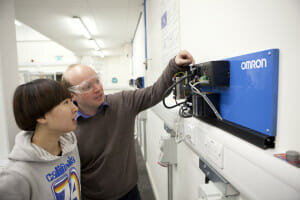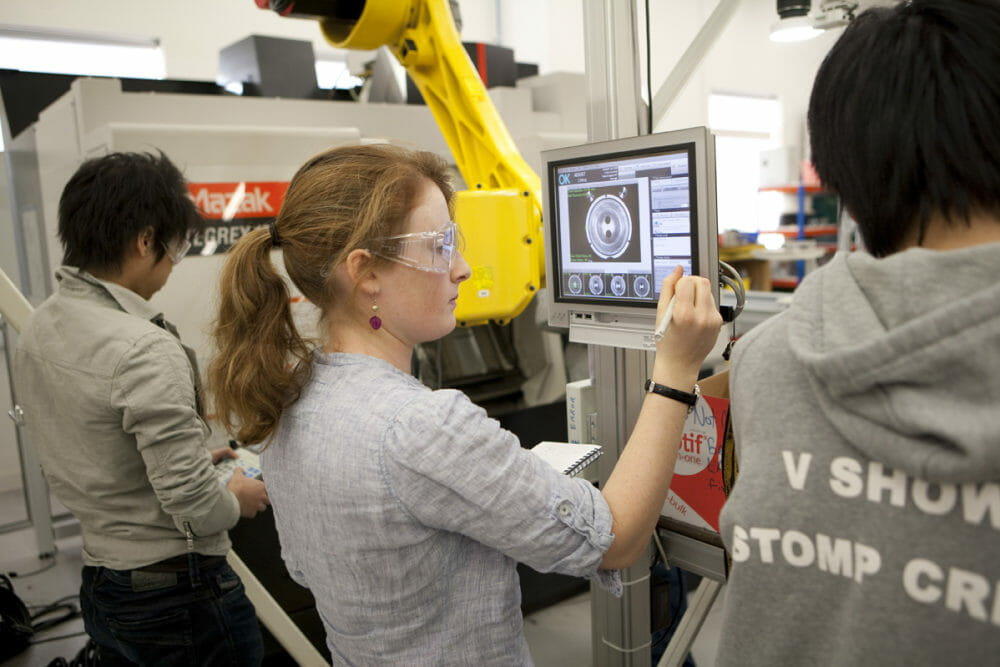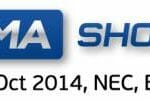Collaboration between automation vendors and engineering education establishments is vital if students are to gain a good understanding of state-of-the-art automation technology and become an asset to any manufacturing workforce. Omron has been working with the University of Cambridge’s Department of Engineering for more than 20 years – specifically the Institute for Manufacturing (IfM) – to ensure that its engineering students remain up to date in the fast paced world of controls, drives and automation.
According to a 2011 study from the Royal Academy of Engineering, British industry needs 100,000 new graduates in science, technology, engineering and mathematics (STEM) subjects and a further 60,000 technicians and apprentices every year until 2020 just to maintain current employment numbers.
The report ‘An insight into modern manufacturing’ identified engineering skills shortages as being one of the main constraints on the ability of UK manufacturing to grow and compete with the rest of the world.
 “The issues surrounding education have been a concern since publication of ‘The Leitch Review of Skills’ in 2006, which stated that the UK was almost becoming a third-world country for manufacturing and engineering due to an engineering skills gap,” said Karl Walker, Omron’s Marketing Manager for Automation products. “Unfortunately, since publication of the report there appears to have been little progress. A lack of continuous development of engineering skills over the years has left many engineers out of touch with the latest technologies and trends in the industry.”
“The issues surrounding education have been a concern since publication of ‘The Leitch Review of Skills’ in 2006, which stated that the UK was almost becoming a third-world country for manufacturing and engineering due to an engineering skills gap,” said Karl Walker, Omron’s Marketing Manager for Automation products. “Unfortunately, since publication of the report there appears to have been little progress. A lack of continuous development of engineering skills over the years has left many engineers out of touch with the latest technologies and trends in the industry.”
Omron has identified a general deskilling trend among many of its own customers over the years. This has resulted in the need to outsource skilled engineering needs. Omron has become an additional engineering resource for many customers, using its own application engineers to fill the skills gaps. “I believe it is vital that automation technology companies are actively involved in upskilling their customers to ensure that engineers have a good understanding of the latest automation technology and how it can help manufacturing companies to achieve productivity and efficiency goals,” comments Karl.
The relationship between automation technology suppliers and engineers needs to start early – while the engineers of the future are still in education – to support manufacturing sector growth by ensuring a competent workforce for the future.
 At the University of Cambridge’s Department of Engineering the IfM takes a cross-disciplinary approach to bring together expertise in management, technology and policy to address all the industrial issues that students will face when entering the workplace.
At the University of Cambridge’s Department of Engineering the IfM takes a cross-disciplinary approach to bring together expertise in management, technology and policy to address all the industrial issues that students will face when entering the workplace.
The relationship with the IfM began with Omron presenting an annual lecture to the Manufacturing Engineering Tripos (MET) students, in the final year of their Masters Degree in Manufacturing Engineering. Karl has been presenting this lecture for the past five years. “I lecture on the subject of programmable logic controllers (PLCs) in manufacturing, whilst my colleague, Justin Baker provides hands-on programming training, introducing the IEC 61131-3 languages and methodologies.”
Omron has also recently become involved in Industrial Systems, Manufacturing and Management (ISMM), which is one of the most over-subscribed post-graduate courses at Cambridge. Delivering a lecture that forms part of the one-year Masters in Philosophy degree (M.Phil), students receive a good understanding of automation within the manufacturing process, enabling them to work more effectively in the manufacturing sector in a variety of management roles.
“The IfM’s relationship with Omron has evolved over the years,” said Dr Ken Platts, University Reader in Manufacturing and previously Director of the Manufacturing Engineering Tripos course at Cambridge. “Today the company is involved in more detailed teaching, showing the students how to programme and to use PLCs in automation projects.”
The IfM includes a simulated manufacturing environment – the Automation Lab – in which all control is achieved via donated Omron PLCs. The company has also supplied a variety of complementary equipment such as vision systems, RFID and safety products for the Automation Laboratory cell.
“For the University of Cambridge, relationships with automation suppliers are essential to ensure our students gain a good knowledge of the latest technologies and to provide students with hands-on experience of these technologies. We are able to use donated equipment for both training and research purposes. Universities today are suffering funding cuts which make it more difficult to justify expenditure on much of the automation technology needed to educate engineering students. Omron’s input offers a great addition to our course and we do very much value the relationship and the company support,” said Dr Platts.
At the IfM, students are required to design a totally integrated automated system to manufacture a component and build an assembly from scratch. The Automation Lab allows them to apply the theories they have been taught and to work through all the steps that they would encounter in real-life situations.
Omron has also benefitted from the relationship as it can gain access to the combined problem-solving knowledge of the IfM professors and students. Karl explains further: “Omron is also involved in sponsoring the projects of final year MET students. The projects this year were both very impressive. One was based around the Automation Lab, looking at the reconfigurability of manufacturing automation software systems. The other project looked at the issues surrounding industrial control systems training – focusing on the requirements for, and delivery of, training to manufacturing production control engineers.” Karl went on to explain that this project made use of a recently donated rig designed to train and troubleshoot industrial automation problems, specifically in the field of servo drives and sensor systems. The training rig was originally employed at Omron’s UK headquarters in its Exhibition Plaza to demonstrate new technologies to customers.
“Omron is proud to be an active participant in raising the engineering skills level and to ensure that engineers and engineering students keep abreast of changing automation technologies. Automation is now starting to merge into the IT world – with much tighter integration of automation systems into enterprise systems. The PLC is no longer a ‘dumb device’. Courses need to reflect these developments to ensure that their teaching stays in line with current trends,” concludes Karl.





